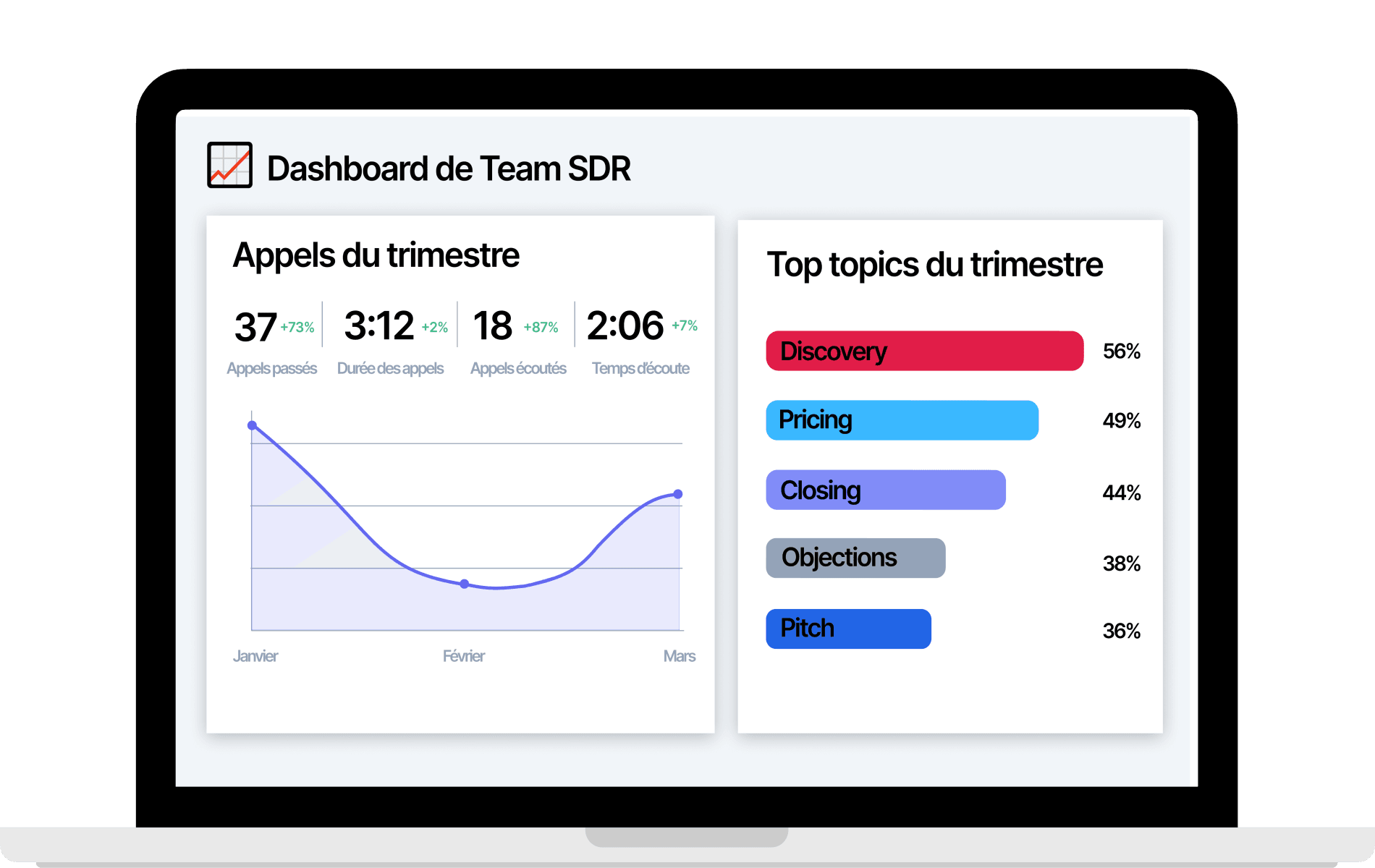Efficiently manage your business with dashboards
- Leverage sales data
- Guide sales teams
- Make the best decisions

Sales dashboards are essential Business Intelligence tools for tracking your company's market performance. Sales teams thrive in dynamic, goal-driven environments. A data-driven sales team closely monitors both individual and collective performance daily to adjust or improve strategy in real time.
What is a sales dashboard?
How often do salespeople make decisions based on intuition and gut feeling? Sales dashboards display relevant, actionable data so sellers can make decisions based on data.
When does the need for a sales dashboard arise?
Salespeople and their managers collect and use large amounts of data to optimize sales processes and generate accurate forecasts, also known as "business intelligence". However, the sheer volume of available data can be overwhelming and hard to digest.
That’s where the sales dashboard comes in. It allows sellers and other executives to visualize and draw conclusions from a variety of data at a glance, in an easy-to-read and use format.
Dashboards are highly customizable and useful in every industry. All the data they contain is organized to help you understand what happened, why it happened, what could happen next, and what actions you should take. In dashboards, you'll find visualizations like tables, charts, and diagrams so everyone can quickly and easily grasp the data.
Don’t confuse with
For comparison, reporting is also commonly used to collect and analyze data. But unlike dashboards, reports aim to provide an in-depth view of a data set and tend to focus on a single element or event.
Why are sales dashboards important?
Sales dashboards allow sellers to focus on selling and spend less time on admin tasks and searching for the data they need. Sales analytics teams have the heavy task of cleaning and analyzing CRM data. Exporting data from CRM source systems is very manual and time-consuming, making ad hoc account analysis nearly impossible. Data exported from CRM tools is often limited, quickly becomes static and outdated, and remains in untested spreadsheets.
What data should you include in a sales dashboard?
As you can see, sales dashboards enable analysts to make more accurate sales forecasts, managers to plan territories more strategically, and salespeople to know exactly where they stand against their targets.
Data selection
One of the advantages of sales dashboards is their almost unlimited possibilities in terms of the types of data that can be processed. The data used for these dashboards can be collected from various sources, such as customer relationship management (CRM) systems, inventory management systems, accounting systems, and sales tracking systems. These are often key performance indicators (KPI) or other important business metrics that stakeholders need to see and understand at a glance.
Types of sales dashboards
Sales team performance dashboards
Dashboards showing the current performance of the sales team can be very motivating for salespeople. This sales dashboard shows how to rank each rep based on the metrics that most impact your business. These dashboards help managers track their sales team's performance by taking each seller's results, averaging them, and checking pipeline health. Call transcription then lets you see your teams’ best practices. It also considers the number of calls made and the success rate. For example, the conversational intelligence software Leexi creates dashboards that give you instant access to your teams’ performance through call and/or video conference transcriptions.

Sales dashboards
This type of dashboard typically displays general sales figures. Instantly visualize any combination of key metrics, including total revenue, profit margin, revenue growth, or win rate.
Sales conversion dashboard
This dashboard displays different conversion rates for each stage of the sales process. Here, speech to text is used to get precise data. You can also display lead conversion rates, converted leads, lead/opportunity ratio, or opportunity/win ratio. This data visualization helps team members understand exactly which steps in the process need improvement.
Product performance dashboard
If your company sells many products, the product performance dashboard is a great option for your team. This type of dashboard can display acquisition costs per product, revenue per product, or product sales by campaign.
Sales activity dashboard
If productivity is an issue for your team, a sales activity dashboard can help. These charts can show time spent on daily sales activities, including calls made, emails sent, deals won, demos viewed, and follow-up visits sent.
Also consider including a data source for average store activity. This metric measures the level of engagement customers typically need to make a purchase. In any case, using a SaaS (software as a service) can also be very useful.
Benefits for your business
Using dashboards is not a waste of time; on the contrary, it will help you save time and stay organized in the long run. Here’s a non-exhaustive list of the benefits you’ll find in using dashboards:
Improve decision-making: Sales dashboards provide a quick and easy-to-understand overview of the company’s situation, enabling leaders to make informed decisions based on factual data.
Identify growth opportunities: Sales dashboards help you spot trends and opportunities in sales and performance, allowing your business to seize growth opportunities.
Solve problems: Sales dashboards allow you to quickly detect emerging issues, enabling fast reactions and resolving problems before they become too significant.
Enhance communication: Beyond improving communication among team members, sales dashboards facilitate better information flow between departments and with stakeholders.
Optimize performance: By analyzing the company’s KPIs, it’s easier to set goals and implement action plans to improve performance.
Conclusion
Sales dashboards are powerful tools for tracking your company’s market performance. They allow you to compile and present your business’s key data in an engaging format. Sales dashboards can help your business make informed decisions, identify growth opportunities, and solve problems quickly. Plus, many software solutions are available to simplify the process. So, why not try using dashboards?
Ready to boost your productivity with Leexi?
Leexi AI Notetaker takes notes for you